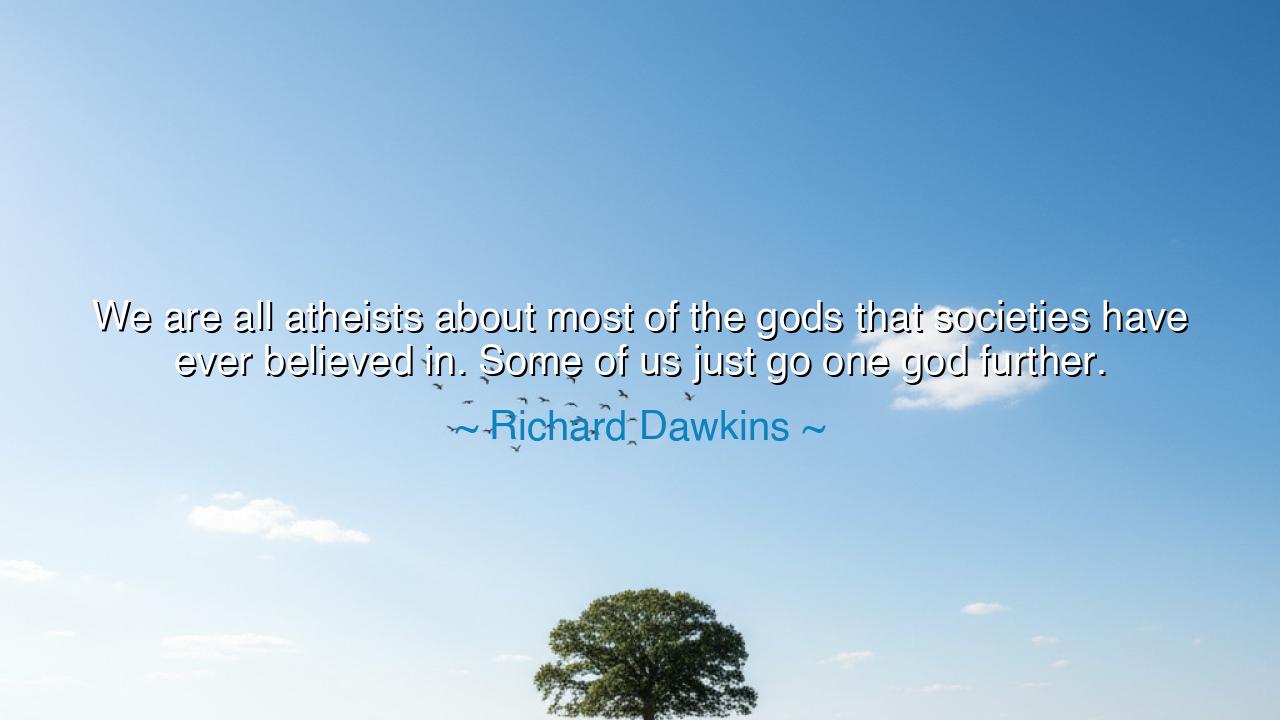
We are all atheists about most of the gods that societies have
We are all atheists about most of the gods that societies have ever believed in. Some of us just go one god further.






The words of Richard Dawkins, the modern philosopher and biologist, strike with a blend of wit and piercing clarity: “We are all atheists about most of the gods that societies have ever believed in. Some of us just go one god further.” In this declaration lies a profound meditation on reason, belief, and the human tendency to seek explanations for the mysteries of life. Dawkins reminds us that faith is selective, shaped by culture, tradition, and circumstance, and that the step from questioning many gods to questioning the one God is a natural progression of critical thought. His words challenge the listener to reflect upon inherited beliefs and the courage it takes to examine them.
The origin of this quote emerges from Dawkins’ lifelong commitment to science and rational inquiry, particularly in works such as The God Delusion. Living in a world where religious belief permeates culture, politics, and morality, Dawkins observed that humans instinctively discard the gods that fail to resonate with experience or logic. He presents atheism not as a radical departure from human nature, but as a continuation of a common skepticism that has existed throughout history. The insight is both daring and subtle: to doubt a deity is to follow the thread of reason where it leads.
At the heart of this teaching is the recognition that human belief is not uniform. Societies have created innumerable deities—gods of thunder, harvest, fertility, and justice—yet most of us accept only those that shape our lives and traditions. To be an atheist to the others is almost inevitable. Dawkins’ quip that “some of us just go one god further” acknowledges the courage it takes to extend skepticism to all divine claims, even those deeply embedded in culture and personal experience. It is a call to intellectual honesty, to examine inherited beliefs without fear, and to seek truth through reason rather than conformity.
History provides examples of this path of inquiry. Consider Galileo Galilei, who, though deeply religious, questioned the accepted cosmology of his time. His insistence that the Earth revolves around the Sun challenged prevailing theological doctrines, placing him at odds with the Church. Like Dawkins’ atheist who goes “one god further,” Galileo pursued truth beyond the comforts of tradition. Though persecuted, his courage reshaped human understanding, showing that inquiry must sometimes transcend deeply held belief.
Dawkins’ statement also evokes the emotional tension of questioning. To doubt is not merely an intellectual act, but a moral and spiritual challenge. It requires humility to acknowledge the limits of inherited wisdom, courage to confront uncertainty, and resilience to withstand the social pressures that enforce conformity. In this way, the quote serves as both observation and exhortation: reason demands vigilance, and the pursuit of understanding is inseparable from personal integrity.
The lesson of this insight is timeless. Questioning should not be feared, for it is the path to knowledge and self-awareness. One must reflect critically on inherited beliefs, seeking consistency, logic, and ethical coherence. Recognize the gods we have outgrown, the myths that no longer serve, and the patterns of thought that constrain our vision. To take the extra step—to go “one god further”—is to embrace intellectual courage, to confront uncertainty, and to align belief with evidence.
Practically, this teaching encourages the cultivation of critical thought and moral courage. Engage in dialogue, read widely, and examine the reasons behind your beliefs. Observe the world with curiosity, and be willing to revise your understanding when evidence compels it. In doing so, one honors both the human mind and the pursuit of truth, recognizing that growth often demands leaving behind comforting illusions.
Thus, the words of Richard Dawkins endure as a beacon for seekers of knowledge: “We are all atheists about most of the gods that societies have ever believed in. Some of us just go one god further.” Let them remind us that skepticism is natural, inquiry is noble, and courage is required to pursue truth wherever it leads. By examining our beliefs with honesty, we not only deepen understanding but also cultivate the wisdom to navigate life with clarity, integrity, and reasoned conviction.






AAdministratorAdministrator
Welcome, honored guests. Please leave a comment, we will respond soon